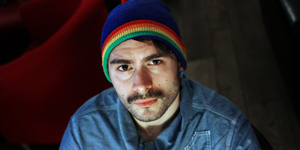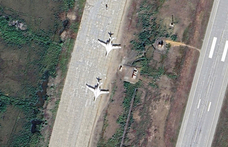 © orwell.hu |
The Memory Human Education Centre was opened in Hodmezovasarhely at the beginning of July. The centre examines five hundred years of the relationships between the city and the provinces. You ran this project, you came up with the idea: it is the result of two years' work. The Left took the result far better than they did the House of Terror, which you also created. Is the past depicted in more nuanced fashion in Vasarhely?
Nobody denies the need for these museums any longer. I'd like to think it was more than praise from abroad and winning some of the leading Hungarian prizes that led people to change their minds. The House of Terror Museum has had almost 2m visitors over the past four years, which is a great success. One fifth of Hungary's population. A huge number. But Hodmezovasarhely can also be proud: in just one month, more than 15,000 people visited the museum. This is also a clear success.
Every city should have a similar institution dedicated to unearthing the past and building a community. We stress the importance of a visual approach and an emotional effect in both museums, and we speak in a language that young people understand. This is because it is primarily the young we want to address. It has become clear that growing generations are also interested in the past, but they need to be addressed using the visual and musical effects their culture is used to.
As far as nuance is concerned, the two institutions convey their messages in very different ways. The House of Terror talks of victims and crimes - we focused there on the era of terror, which was 'shared' by two totalitarian dictatorships: Nazism and communism.
In Hodmezovasarhely, however, we try to introduce the period between 1945 and 1990, which cannot be depicted in black and white. There were dramatic periods in Vasarhely's history, especially in the 1950s, but later, in the time of goulash communism, the citizens of the town came to know more liveable, more successful years. And that, too, is part of the story.
There's little evidence of this nuanced approach in preparations for the commemoration of the 50th anniversary of 1956. Both political wings have decided that they either will or will not take part in the official commemorations, even though Laszlo Solyom, the president, is calling for joint participation.
In my view, the events surrounding the 50th anniversary of the revolution are not just sad, but mistaken too. Hungary made history in October 1956. The whole world looked to us. The generation that took part in this movement of historic importance is still alive and is still linked emotionally to the revolution. The Hungarian people showed its most positive face to the world: its heroism, its bravery and its love of freedom became known to the world.
It would have been in our interest to take steps towards creating national unity on this anniversary, and to demonstrate to the world those positive characteristics which created unity in Autumn 1956. Just how justified this would have been is shown by the fact that the president of the United States has honoured the revolutionaries twice this year already.
At the same time, we in Hungary are neglecting this glorious occasion. We have not prepared a suitable commemoration of this anniversary. "We did not dress up our hearts," which is to say we have not risen to the occasion. It is now the eleventh hour. We have a great responsibility. Hungarian TV has been showing adverts for months about our goal of jointly hosting the 2012 UEFA cup with Croatia, but there is little sign of the media preparing the public to commemorate 1956. It's typical that the first prize in a student essay competition marking the occasion was a trip to Moscow. You sometimes feel that the governing parties want to sabotage the commemorations of 1956.
Second part of the interwiev (Oldaltörés)
Maybe it's all down to a lack of money?
Lack of money explains nothing on its own. It looks like there is money for the commemorations, but we don't know what will happen to it. The Prime Minister's Office recently set aside HUF1.7bn for the purpose and asked for tenders on 31 July. They reserved the entire sum in one go for the events. We would not be surprised if, as usual, a 'friendly' organising company gets the money at some point. In just two weeks, bidders had to come up with a detailed proposal, and I don't think this would have been possible in such a short time.
Fidesz seems still to be licking its wounds from the elections. Its leaders seem too exhausted to criticise the government. Many think we have neither a government nor an opposition. It is almost as if the party is vacillating: does it need a new leader or not? Would it not have been better to turn away from the far right and look for voters in the centre?
Fidesz does not need to open towards the centre, because it is already in the centre. I'd like to hear this criticism levelled at the Socialists for once, since they have made precious few gestures in recent years towards the post-communist 'centre'. I would like to see Fidesz turn into the 21st century party which climbs out of the provincial swamp of Hungarian politics and offers new answers to the new challenges. There are major debates within the party about the reasons for the defeat. We should find a way of making the largest party of the Right more acceptable and likeable. We are looking for ways of changing, but we have to reconcile many different tastes, desires and political directions. We need to look at ourselves and build up our internal structures. It is clear that our policies have to change as well, especially with respect to Budapest.
Yet, in preparing for the local elections, the Fidesz is in many places allying itself with the Movement for a Better Hungary (Jobbik) and even with the Hungarian Truth and Life Party (MIEP).
I think it's manipulative to accuse the party of having far-right sympathies because of a couple of occasional deals made before the local elections.
Regardless of the parties, what do you think has been achieved since 1989?
In many respects, Hungary's achievements between 1990 and 2006 has been bitterly disappointing. This despite the fact that the regime change was peaceful, with the elite almost fully preserving its old position. The 'old guards' kept hold not just of their political and network capital, but were able to add wealth to the equation as well. Unfortunately, it seems we did not measure up to the challenges. The Right governed on two occasions, between 1990 and 1994 and between 1998 and 2002. Jozsef Antall's 'kamikaze' government, the first, achieved much that is recognised both here and abroad. Nonetheless, almost the entire post-communist elite turned against Antall, criticising him sharply and behaved with impatience toward him. They managed to persuade the public that only the Left had expertise, and that the Right was stuffed with useless nobodies and amateurs.
Viktor Orban was able to set up a coalition government, but the economic and media elites remained unchanged. It is characteristic that the daily Nepszabdsag's list of the 100 most influential Hungarians numbered only a few people of right-wing persuasion. This 'hardening' of society and the fact that the political elites seem to be very poor at communication bear great risks and could lead to a radicalisation of society.
That's just what Miklos Gaspar Tamas said in a recent article which you criticised strongly in a recent article in Nepszabadsag.
There is no question that Miklos Gaspar Tamas's recent article was a vicious attack on the bourgeoisie. His advocacy of resolution verges on the unconstitutional. It is interesting that when Imre Kerenyi spoke of resolution, the Left was in uproar for weeks.
The real crime of today's press - both on the left and on the right - is not that it is biased or servile, but that it has bad, mistaken political reflexes. It works poorly, incoherently. For this reason the press does not recognise the real danger. In order to manipulate it lumps the moderates and the extremists into one category and one day it will be astonished when that half of the country which yesterday voted for the moderates suddenly sets itself up independently of today's two political forces.
In a country where half the people feel that they were pushed into the background for 45 years, where these people feel they were prevented from achieving their goals, because others were in a better position, and where those same people were also disappointed by the changes when they came, it is possible that this chronically frustrated mass will start to radicalise. But Fidesz can do nothing about this.
What kind of solutions can you envisage in the future?
The government is achieving almost nothing, and there is little sign that this is about to change. The recently announced cuts package looks like Kadarism, but it is even worse. Kadar's people were careful not to push things too far. But these measures are just making people angry - they are arrogant and cynical moves. Perhaps the most serious of the many lies was that Gyurcsany was so hungary for power that he and his government had no reform plans ready. The country is in a bad state, and it looks like that Romania and Bulgaria, which will soon join the EU, will adopt the euro sooner than we will. A sense of responsibility for the nation demands that when we hit rock bottom - and foreign reactions will tell us we have - then a government of experts has to be formed, and parties will have to take the back seat.
János Pelle

















